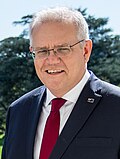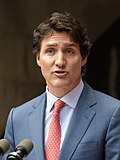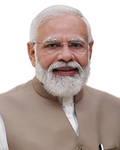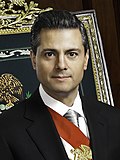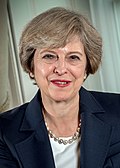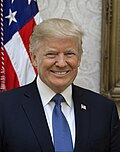Preparations
Argentine president Mauricio Macri of Argentina assumed the one-year G20 presidency on 30 November 2017, during an official ceremony at the Kirchner Cultural Centre in Buenos Aires. Chinese leader Xi Jinping (2016 host), German chancellor Angela Merkel (2017 host), and Japanese prime minister Shinzo Abe (2019 host) all sent messages of support, which were shown at the ceremony. [3]
The first G20 meetings of the Argentine Presidency began in Bariloche in early December 2017. They were attended by central bank deputy governors and deputy ministers of finance, as well as the sherpas. During the buildup to the G20 Summit between world leaders on 30 November 2018, Argentina hosted over 45 meetings at various government levels and areas in 11 different cities throughout the country. [4]
Security
The previous summit in Hamburg, Germany, met with huge protests, with cars set on fire and roads blocked by protesters. The 2018 summit had reinforced security, to prevent a repeat of those protests. Local left-wing organizations planned protests and called for foreign activists to join them. [12] The Argentine government, working alongside the others, is attempting to prevent the entry of troublemakers into the country, such as people with criminal charges or who have advocated for violent actions. Only peaceful protests will be allowed. Federal Security Minister Patricia Bullrich said that "We will not permit illegal acts. Those who want to cross the line will have to face the legal consequences". [12] 22,000 police and 700 security ministry agents will guard the event, working alongside the security services of the United States, the United Kingdom, Brazil, Italy, Spain and others. An area of 12 square kilometres (4.6 sq mi) around the Costa Salguero Convention Centre [ es ] will be cordoned off, the public transportation network – including the metro – will be shut down, and traffic along the River Plate will be halted. Friday, 30 November was declared a one-time public holiday day in the city of Buenos Aires, to prevent the traffic caused by people's daily activities, and residents were urged to leave the city for the long weekend. [13] Media Minister Hernán Lombardi reported that no infiltration by international terrorist groups had been detected, and the US government said that the remote location of Argentina would discourage international protesters from travelling to the country. [12]
Two bomb attacks took place in the days before the summit. Judge Claudio Bonadio, who was investigating former president Cristina Fernández de Kirchner for embezzlement charges, was attacked in his home; his bodyguards stopped Marco Viola, who was arrested, and the bomb was dismantled by a police bomb squad. Anahi Esperanza Salcedo, who identifies as an anarchist and a radical feminist, tried to bomb the tomb of the late chief of police Ramón Lorenzo Falcón at La Recoleta Cemetery, but her bomb went off early and she was hospitalized with injuries to her hand and face. Both attacks were made with improvised explosive devices. [14] After those events, the United Kingdom government lowered its terrorism alert for Buenos Aires from "very likely" to "likely". [15]
This page is based on this
Wikipedia article Text is available under the
CC BY-SA 4.0 license; additional terms may apply.
Images, videos and audio are available under their respective licenses.



